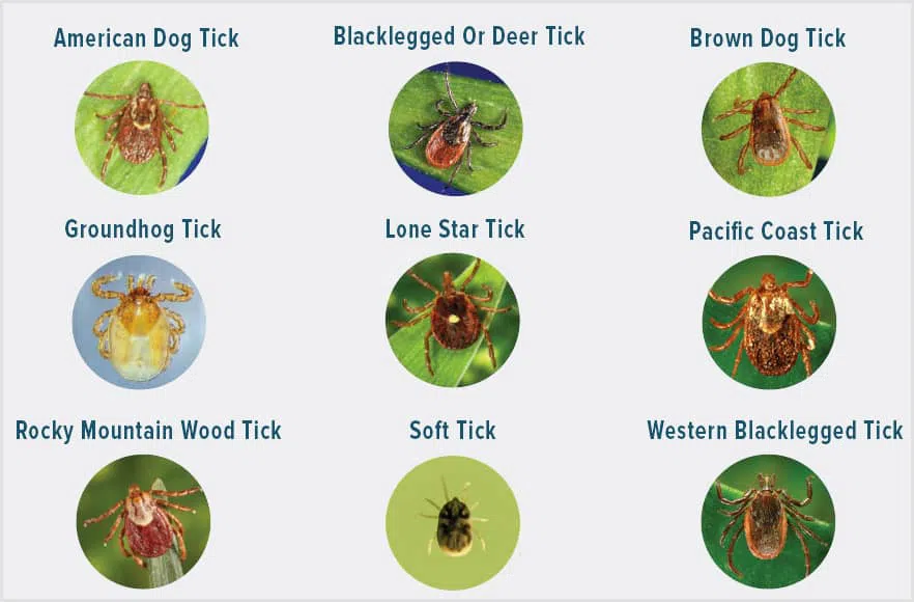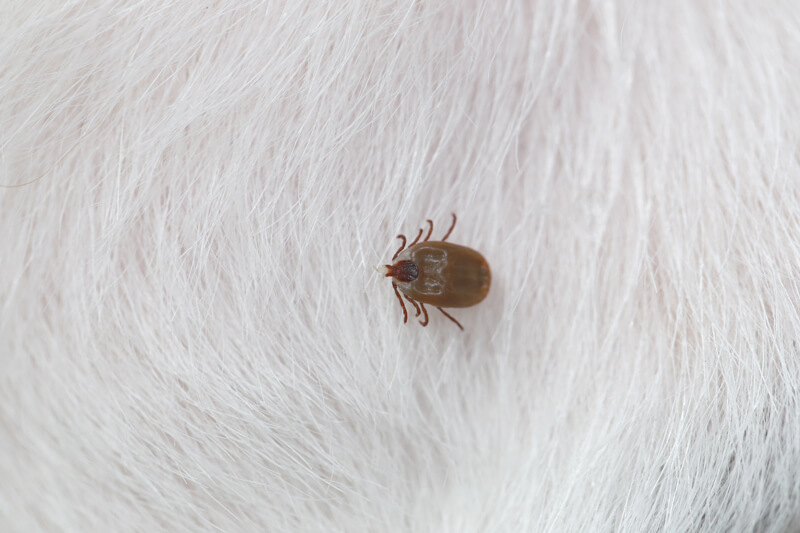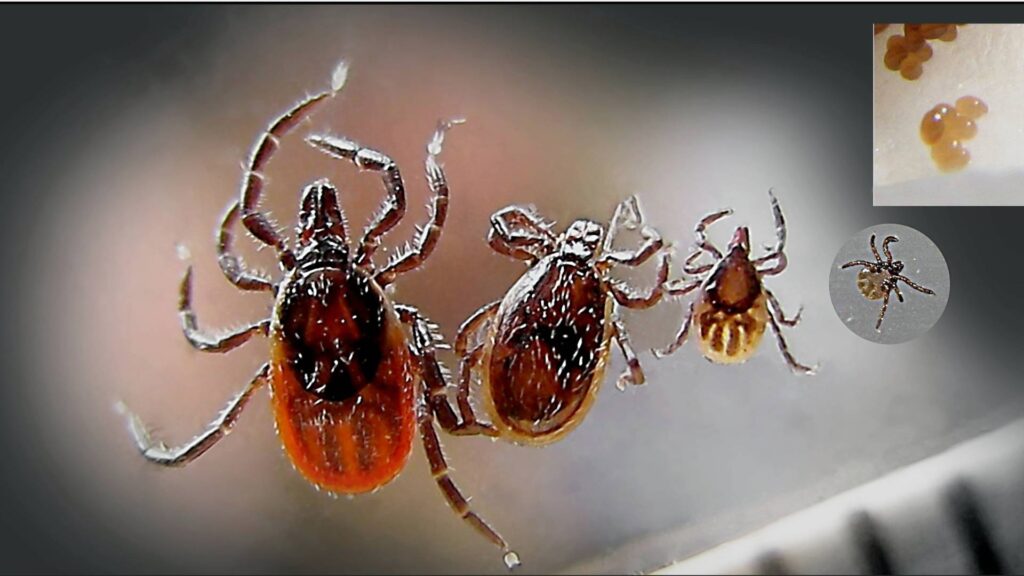Tick Treatments in Florida
Exterminator Services for Port Orange Edgewater and New Smyrna Beach
Tick Control in Port Orange, Florida, Pest Control Xperts
Enjoying the outdoors is part of life in Port Orange, but walking through tall grass or exploring the trails near Turnbull Bay often comes with a hidden risk: ticks. Pest Control Xperts provides specialized tick control and removal services for homeowners and pet owners in Port Orange, Edgewater, and New Smyrna Beach. Unlike many other pests that are simply annoying, ticks are blood-feeding parasites that can transmit serious diseases to both humans and pets.
We understand the panic of finding a tick embedded in your skin or discovering one crawling on your dog after a walk. While many people assume ticks are only an outdoor problem, certain species like the Brown Dog Tick can infest the interior of your home, hiding behind baseboards and climbing curtains. Our team focuses on careful pest inspection to identify the species and safe pest management practices to eliminate the threat. Whether you have a wooded lot in Spruce Creek or a suburban yard in Waters Edge, we have the local expertise to protect your family.
Contact us today to schedule your tick assessment.
Tick Problems We Solve in Port Orange
Ticks are resilient arachnids that wait patiently for a host to pass by. In Volusia County, our warm winters mean tick season never really ends. They are carried into yards by wildlife like raccoons, opossums, and deer, dropping off to wait for their next meal—often you or your pet. An infestation can go unnoticed until you find a tick attached, as their bites are often painless due to anesthetic in their saliva.
We handle infestations ranging from seasonal yard surges to severe indoor breeding populations. Our technicians understand that effective insect control for ticks requires a different strategy than for fleas or ants. We utilize advanced infestation control methods that target the cracks and crevices where ticks hide and the vegetation where they wait.
Common signs of a tick issue:
- Finding a tick attached to yourself, a family member, or a pet
- Small, dark arachnids crawling on walls, curtains, or furniture
- Red, irritated bumps on the skin after being outdoors
- “Seed ticks” (clusters of tiny larvae) on pant legs or shoes
- Ticks found around door frames or window sills
- Pets scratching or biting at their ears or paws
- Sightings of wildlife (raccoons, stray cats) frequenting your yard

Types of Tick Issues We Handle
Interior Brown Dog Tick Infestations
The Brown Dog Tick is unique because it can complete its entire life cycle indoors. This species does not need to go back outside to lay eggs. If brought inside, they can infest kennels, bedding, and even furniture. They are famous for climbing upwards, so you may find them near the ceiling or hiding in picture frames. This is a severe issue that requires specialized indoor treatment.
What we look for during inspection:
- Ticks tucked into the cracks of baseboards
- Activity behind door casings and window moldings
- Ticks hiding in the folds of upholstered furniture
- Clusters of eggs or larvae in upper corners of a room
How we approach treatment:
We use a crack-and-crevice injection method. Since these ticks hide deep in structural gaps, surface sprays often miss them. We treat the harborage areas directly. We also recommend treating all pets simultaneously with veterinary-approved medication to prevent re-infestation.
Exterior Yard and Perimeter Control
Most tick encounters happen in the backyard. Ticks like the American Dog Tick and the Lone Star Tick wait on tall grass and shrubs (a behavior called “questing”) to grab onto a passing host. Properties bordering woods or unkempt lots are at high risk. The goal is to create a barrier that stops ticks from migrating onto your lawn.
What we look for during inspection:
- Overgrown vegetation and tall grass at the property line
- Leaf litter accumulation where ticks breed
- Shaded, moist areas under decks or shrubs
- Animal paths or burrows indicating wildlife activity
How we approach treatment:
We apply residual products to the “ecotone”—the transition area between your manicured lawn and the woods or brush. We target the underside of leaves and shaded areas where ticks stay to avoid drying out. We do not broadcast spray open sunny grass where ticks are unlikely to survive.
Wildlife Management for Tick Reduction
You cannot solve a tick problem if you have a wildlife highway running through your yard. Raccoons, opossums, and rodents are the primary “taxis” for ticks. If these animals are nesting under your shed or house, they are dropping ticks daily.
What we look for during inspection:
- Holes under fences or lattice
- Burrows under foundations
- Food sources like bird feeders or open trash
How we approach treatment:
We focus on exclusion techniques for pests to keep wildlife out of your immediate living space. By sealing off access to crawlspaces and decks, we reduce the number of host animals bringing parasites onto your property. We also advise on landscaping changes to make your yard less inviting to wildlife.
Our Tick Inspection and Treatment Approach
At Pest Control Xperts, we take ticks seriously due to the health risks involved. Our pest inspection is detailed. We verify the species of tick, as this dictates the treatment plan. Knowing whether you have a wood tick or a kennel tick changes everything about how we proceed.
Our treatment combines chemical and cultural controls. We use professional-grade acaricides (tick-specific products) that provide a quick knockdown and lasting residual protection. We focus on the “hot spots” where ticks congregate rather than needlessly spraying every inch of your property. We practice safe pest management, ensuring that treatments are applied in a way that is safe for your family and pets once dried.
We also focus on education. We explain the tick life cycle and why you might see activity for a short period as the population collapses. We help with pest assessment services to point out the specific conditions in your yard—like that pile of wood or that overgrown fence line—that are contributing to the problem.
Tick Prevention and Pest Proofing Tips for Port Orange Homes
Preventing ticks is largely about landscaping and personal protection. By modifying your yard, you can make it a hostile environment for ticks, which prefer high humidity and shade.
Our team helps you implement pest deterrent strategies that reduce tick populations naturally. Pest proofing your yard against wildlife also plays a huge role.
Preventative steps that actually help:
- Keep grass mowed short; ticks dislike direct sunlight and heat
- Create a 3-foot barrier of wood chips or gravel between lawns and wooded areas
- Remove leaf litter, brush piles, and weeds from the edge of the yard
- Stack wood neatly and in a dry area to discourage rodents
- Keep playground equipment, decks, and patios away from yard edges
- Fence your yard to keep out deer and stray animals
- Check pets for ticks daily, especially around the ears and paws
- Remove bird feeders if they are attracting rodents and raccoons
- Seal gaps in windows and doors to prevent ticks from crawling inside

Residential and Commercial Tick Control
We serve both residential homes and commercial properties. For homeowners, especially those with children and pets, tick control is a safety issue. We provide peace of mind so you can enjoy your backyard barbecues without worry.
For commercial clients, such as campgrounds, parks, outdoor event venues, and doggy daycares, tick control is essential for liability and customer satisfaction. We provide commercial pest services that include perimeter treatments and regular monitoring. We help you maintain a safe environment for your guests and their four-legged companions.
Professional Tick Extermination vs DIY Methods
Many homeowners try to treat ticks with hardware store sprays, but ticks are incredibly tough. Their hard exoskeletons protect them from many general-purpose insecticides. DIY products often lack the residual sticking power needed to remain effective on vegetation during Florida’s rainy season.
treating an indoor infestation of Brown Dog Ticks is nearly impossible with DIY methods. Foggers will not reach behind the baseboards or into the ceiling crevices where these ticks hide. You might kill a few on the floor, but the population in the walls will continue to breed.
Professional pest control utilizes specialized application equipment that can deliver product deep into dense vegetation or structural cracks. We also have access to Insect Growth Regulators (IGRs) that stop tick larvae from developing into adults. Using a professional ensures that the entire life cycle is addressed, not just the adults you see today.
Frequently Asked Questions About Tick Control
What diseases do ticks in Florida carry?
In Florida, ticks can transmit Lyme disease (though less common than in the northeast), Rocky Mountain Spotted Fever, and Ehrlichiosis. The longer a tick stays attached, the higher the risk of transmission, which is why quick removal and control are vital.
How do I safely remove a tick?
Use fine-tipped tweezers to grasp the tick as close to the skin’s surface as possible. Pull upward with steady, even pressure. Do not twist or jerk the tick, as this can cause the mouth-parts to break off and remain in the skin. Clean the bite area and your hands with rubbing alcohol or soap and water.
Why am I finding ticks inside my house?
If you find ticks indoors, it is usually because a pet brought them in, or you have an infestation of Brown Dog Ticks. Brown Dog Ticks can breed indoors. If you do not have pets, check for rodents in the attic or crawlspace, as they often bring ticks into the home structure.
Is the treatment safe for my dog?
Yes, we practice safe pest management. We ask that pets be kept inside or away from the treated area until the product has completely dried. Once dry, the area is safe for pets to use. We always recommend pairing our service with a vet-prescribed flea and tick preventative for your animal.
How often do I need tick treatment?
During peak season or in high-pressure areas (like homes backing up to woods), we typically recommend monthly or bi-monthly exterior treatments. This maintains the barrier and accounts for the breakdown of products due to sun and rain.
What are “seed ticks”?
“Seed ticks” are the larval stage of the tick. They are tiny, often no bigger than a poppy seed, and usually attack in large groups. Walking through a nest of seed ticks can result in hundreds of tiny bites on your ankles. They require immediate treatment.
Is there a local tick removal service near me in Port Orange?
Yes, Pest Control Xperts is locally owned and serves Port Orange, Edgewater, and New Smyrna Beach. We know the local tick species and the wooded areas where they thrive, allowing us to provide targeted protection.
Can ticks jump or fly?
No, ticks cannot jump or fly. They crawl. They use a behavior called “questing” where they hold onto leaves or grass with their back legs and reach out with their front legs to grab onto a passing host.

Service Area for Tick Control in and Around Port Orange, Florida
Pest Control Xperts serves the entire Southeast Volusia area. Whether you are near the scrub lands of Edgewater or the manicured lawns of Port Orange, we have the experience to keep ticks at bay.
We serve the following neighborhoods and nearby areas:
- Port Orange
- Edgewater
- New Smyrna Beach
- Ponce Inlet
- Spruce Creek
- South Daytona
- Wilbur-By-The-Sea
Local Service Means:
We are part of this community. We want our neighbors to be safe from tick-borne illnesses. We provide honest, effective service without the hassle.
Zip codes we serve: 32127, 32128, 32129, 32168, 32169
Conclusion
Don’t let ticks keep you from enjoying your yard. At Pest Control Xperts, we provide the barrier protection you need to keep your family and pets safe. We handle the hard work so you can relax outdoors.
Contact us today to schedule your tick control service.
